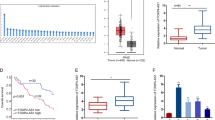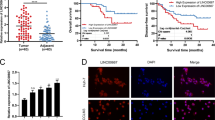Abstract
Long noncoding RNAs (lncRNAs) have been demonstrated to participate in the progression of many malignancies, including prostate cancer by serving as sponges of microRNAs (miRNAs). Initial microarray-based analysis screened out the poorly expressed lncRNA RBMS3-AS3 in prostate cancer, followed by the identification of putative binding sites with miR-4534 and its target VASH1. Therefore, the present study set out to investigate the potential role of RBMS3-AS3/miR-4534/VASH1 axis in the development of prostate cancer. The biological functions of RBMS3-AS3, miR-4534, and VASH1 on cell proliferation, migration, invasion, and angiogenesis of prostate cancer were evaluated via gain- and loss-of-function experiments. Furthermore, tumor xenograft in nude mice was performed to examine tumorigenesis in vivo. The obtained results indicated that RBMS3-AS3 was poorly expressed in prostate cancer tissues and cells. Of note, overexpression of RBMS3-AS3 was found to suppress cell proliferation, migration, invasion, and angiogenesis as well as the tumorigenic ability of prostate cancer. VASH1 was verified as a target gene of miR-4534. VASH1 expression was found to be downregulated in prostate cancer tissues and cells. Interestingly, RBMS3-AS3 was observed to competitively bind to miR-4534 to upregulate VASH1 expression, resulting in a suppressive role in prostate cancer development. Also, in vitro findings were reproduced in vivo on tumor xenograft in nude mice. Taken together, the present study provides evidence suggesting that RBMS3-AS3 acts as a miR-4534 sponge to inhibit the development of prostate cancer by upregulating VASH1, highlighting a theoretical target for prostate cancer treatment.
This is a preview of subscription content, access via your institution
Access options
Subscribe to this journal
Receive 12 print issues and online access
$259.00 per year
only $21.58 per issue
Buy this article
- Purchase on Springer Link
- Instant access to full article PDF
Prices may be subject to local taxes which are calculated during checkout







Similar content being viewed by others
Data availability
The datasets generated during the current study are available.
Change history
09 January 2024
This article has been retracted. Please see the Retraction Notice for more detail: https://doi.org/10.1038/s41434-023-00439-5
References
Attard G, Parker C, Eeles RA, Schroder F, Tomlins SA, Tannock I, et al. Prostate cancer. Lancet. 2016;387:70–82.
Yedjou CG, Mbemi AT, Noubissi F, Tchounwou SS, Tsabang N, Payton M, et al. Prostate cancer disparity, chemoprevention, and treatment by specific medicinal plants. Nutrients. 2019;11: pii: E336.
Lin J, Kelly WK. Targeting angiogenesis as a promising modality for the treatment of prostate cancer. Urol Clin North Am. 2012;39:547–60.
Misawa A, Takayama KI, Inoue S. Long non-coding RNAs and prostate cancer. Cancer Sci. 2017;108:2107–14.
Wang M, Zhou L, Yu F, Zhang Y, Li P, Wang K. The functional roles of exosomal long non-coding RNAs in cancer. Cell Mol Life Sci. 2019; 76:2059–76.
Zhang Y, Xu Y, Feng L, Li F, Sun Z, Wu T, et al. Comprehensive characterization of lncRNA-mRNA related ceRNA network across 12 major cancers. Oncotarget. 2016;7:64148–67.
Zhang G, Han G, Zhang X, Yu Q, Li Z, Li Z, et al. Long non-coding RNA FENDRR reduces prostate cancer malignancy by competitively binding miR-18a-5p with RUNX1. Biomarkers. 2018;23:435–45.
Aghdam SG, Ebrazeh M, Hemmatzadeh M, Seyfizadeh N, Shabgah AG, Azizi G, et al. The role of microRNAs in prostate cancer migration, invasion, and metastasis. J Cell Physiol. 2019;234:9927–42.
Nip H, Dar AA, Saini S, Colden M, Varahram S, Chowdhary H, et al. Oncogenic microRNA-4534 regulates PTEN pathway in prostate cancer. Oncotarget. 2016;7:68371–84.
Kosaka T, Miyazaki Y, Miyajima A, Mikami S, Hayashi Y, Tanaka N, et al. The prognostic significance of vasohibin-1 expression in patients with prostate cancer. Br J Cancer. 2013;108:2123–9.
Liu S, Pan W, Cheng Z, Sun G, Zhu P, Chan F, et al. Characterization of the T-cell receptor repertoire by deep T cell receptor sequencing in tissues from patients with prostate cancer. Oncol Lett. 2018;15:1744–52.
Lin A, Piao HL, Zhuang L, Sarbassov dos D, Ma L, Gan B. FoxO transcription factors promote AKT Ser473 phosphorylation and renal tumor growth in response to pharmacologic inhibition of the PI3K-AKT pathway. Cancer Res. 2014;74:1682–93.
Bray F, Ferlay J, Soerjomataram I, Siegel RL, Torre LA, Jemal A. Global cancer statistics 2018: GLOBOCAN estimates of incidence and mortality worldwide for 36 cancers in 185 countries. CA Cancer J Clin. 2018;68:394–424.
Fernandes JCR, Acuna SM, Aoki JI, Floeter-Winter LM, Muxel SM. Long non-coding RNAs in the regulation of gene expression: physiology and disease. Noncoding RNA. 2019;5: pii: E17.
Chen Q, Sun T, Wang F, Gong B, Xie W, Ma M, et al. Long noncoding RNA IGF2AS is acting as an epigenetic tumor suppressor in human prostate cancer. Urology. 2019;124:310 e1–10 e8.
Ding L, Ai D, Wu R, Zhang T, Jing L, Lu J, et al. Identification of the differential expression of serum microRNA in type 2 diabetes. Biosci Biotechnol Biochem. 2016;80:461–5.
Watanabe T, Hosaka T, Ohmori-Matsuda K, Suzuki Y, Suzuki H, Yabuki H, et al. High preoperative plasma vasohibin-1 concentration predicts better prognosis in patients with non-small cell lung carcinoma. Health Sci Rep. 2018;1:e40.
Zhou CF, Ma J, Huang L, Yi HY, Zhang YM, Wu XG, et al. Cervical squamous cell carcinoma-secreted exosomal miR-221-3p promotes lymphangiogenesis and lymphatic metastasis by targeting VASH1. Oncogene. 2019;38:1256–68.
Kosaka T, Miyazaki Y, Miyajima A, Mikami S, Hayashi Y, Tanaka N, et al. The prognostic significance of vasohibin-1 expression in patients with prostate cancer. Br J Cancer. 2013;108:2123–9.
Zhang T, Jing L, Li H, Ding L, Ai D, Lyu J, et al. MicroRNA-4530 promotes angiogenesis by targeting VASH1 in breast carcinoma cells. Oncol Lett. 2017;14:111–8.
Silva SA, Gobbo MG, Pinto-Fochi ME, Rafacho A, Taboga SR, Almeida EA, et al. Prostate hyperplasia caused by long-term obesity is characterized by high deposition of extracellular matrix and increased content of MMP-9 and VEGF. Int J Exp Pathol. 2015;96:21–30.
Chen Y, Zheng L, Liu J, Zhou Z, Cao X, Lv X, et al. Shikonin inhibits prostate cancer cells metastasis by reducing matrix metalloproteinase-2/-9 expression via AKT/mTOR and ROS/ERK1/2 pathways. Int Immunopharmacol. 2014;21:447–55.
Munoz-Moreno L, Bajo AM, Prieto JC, Carmena MJ. Growth hormone-releasing hormone (GHRH) promotes metastatic phenotypes through EGFR/HER2 transactivation in prostate cancer cells. Mol Cell Endocrinol. 2017;446:59–69.
Norita R, Suzuki Y, Furutani Y, Takahashi K, Yoshimatsu Y, Podyma-Inoue KA, et al. Vasohibin-2 is required for epithelial-mesenchymal transition of ovarian cancer cells by modulating transforming growth factor-beta signaling. Cancer Sci. 2017;108:419–26.
Kobayashi N, Uemura H, Nagahama K, Okudela K, Furuya M, Ino Y, et al. Identification of miR-30d as a novel prognostic maker of prostate cancer. Oncotarget. 2012;3:1455–71.
Li JB, Liu F, Zhang BP, Bai WK, Cheng W, Zhang YH, et al. LncRNA625 modulates prostate cancer cells proliferation and apoptosis through regulating the Wnt/beta-catenin pathway by targeting miR-432. Eur Rev Med Pharmacol Sci. 2017;21:2586–95.
Acknowledgements
We would like to extend our sincere appreciation to the reviewers for their helpful comments on this article.
Funding
This study was supported by Prostate Cancer Foundation China (PCF China) Young Investigator Award, National Natural Science Foundation Youth Fund (No. 81001143), Shenyang Science and Technology Program Key Science and Technology Research and Development Program (No. 17-230-9-18), the National Key Research and Development Program of China (No. 2017YFC0908003), the First Batch of Talents of Introduction of Top Health Talented Team of Qinghai Province and the First Batch of Talents of Xining “Absorbing 555 Talents Project”.
Author information
Authors and Affiliations
Contributions
Zhenming Jiang and Yuxi Zhang designed the study. Zhenming Jiang, Xi Chen, and Pingeng Wu collated the data, carried out data analyses and produced the initial draft of the manuscript. Zhenming Jiang and Dong Chen contributed to drafting the manuscript. All authors have read and approved the final submitted manuscript.
Corresponding author
Ethics declarations
Conflict of interest
The authors declare that they have no conflict of interest.
Ethical statement
The protocols of this study were approved by the Ethic Committee of the First Hospital of China Medical University and were conducted in strict accordance with the ethical principles for medical research involving human subjects of the Helsinki Declaration. Written informed consents were obtained from all patients prior to the study. The protocol of animal experiments was approved by the Institutional Animal Care and Use Committee of the First Hospital of China Medical University. Animal experiments were conducted according to the Guide for the Care and Use of Laboratory Animals issued by the National Institutes of Health.
Additional information
Publisher’s note Springer Nature remains neutral with regard to jurisdictional claims in published maps and institutional affiliations.
This article has been retracted. Please see the retraction notice for more detail: https://doi.org/10.1038/s41434-023-00439-5"
Supplementary information
Rights and permissions
Springer Nature or its licensor (e.g. a society or other partner) holds exclusive rights to this article under a publishing agreement with the author(s) or other rightsholder(s); author self-archiving of the accepted manuscript version of this article is solely governed by the terms of such publishing agreement and applicable law.
About this article
Cite this article
Jiang, Z., Zhang, Y., Chen, X. et al. RETRACTED ARTICLE: Long noncoding RNA RBMS3-AS3 acts as a microRNA-4534 sponge to inhibit the progression of prostate cancer by upregulating VASH1. Gene Ther 27, 143–156 (2020). https://doi.org/10.1038/s41434-019-0108-1
Received:
Revised:
Accepted:
Published:
Issue Date:
DOI: https://doi.org/10.1038/s41434-019-0108-1
This article is cited by
-
Identification and validation of tryptophan metabolism-related lncRNAs in lung adenocarcinoma prognosis and immune response
Journal of Cancer Research and Clinical Oncology (2024)
-
A prognostic cuproptosis-related lncRNA predictive signature for bladder cancer patients
Human Cell (2023)
-
Long non-coding RNA NR2F2-AS1 regulates human osteosarcoma growth and metastasis through miR-425-5p-mediated HMGB2
International Journal of Clinical Oncology (2022)



